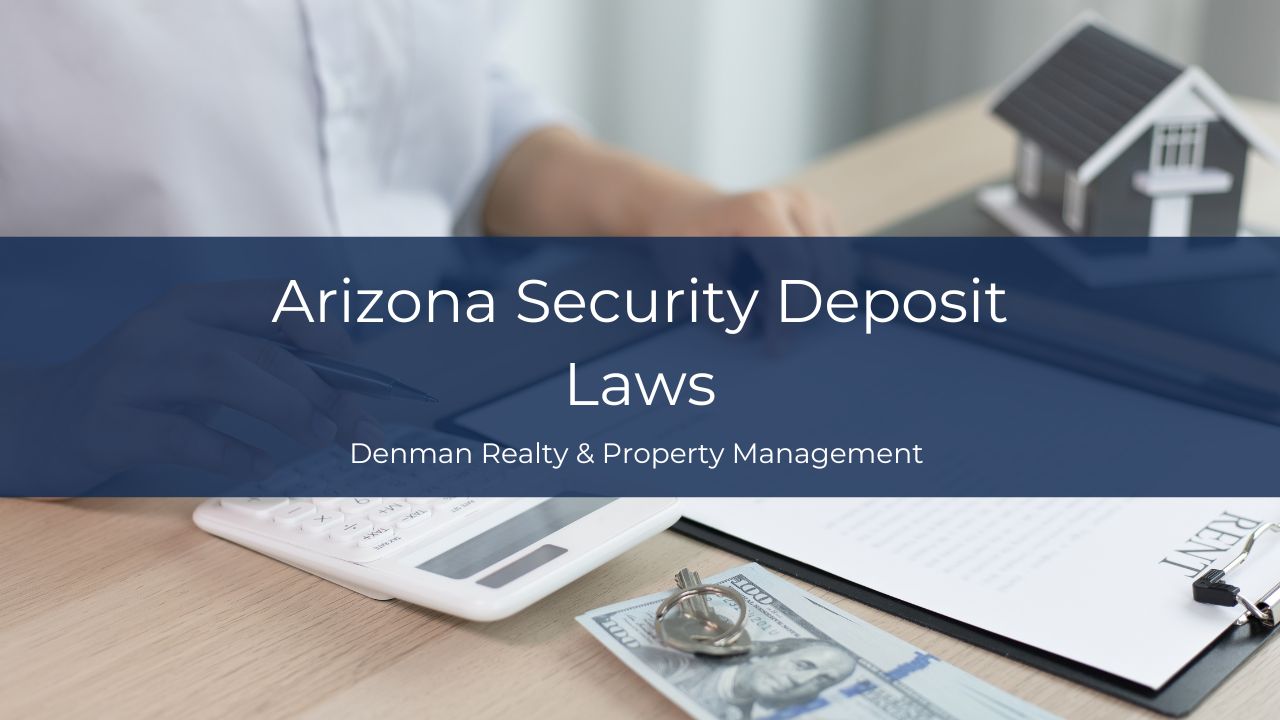When renting out a property in Arizona, it’s essential for landlords to understand the state’s security deposit regulations. Security deposits act as a safeguard for landlords, protecting them against potential damages or unpaid rent. Collecting a security deposit provides several key benefits for Arizona landlords. If you want to learn more about Arizona’s security deposit laws, keep reading!
Overview of Arizona’s Security Deposit Laws
The following is a general overview of the Arizona security deposit laws:
1. Arizona Security Deposit Limit
The maximum amount an Arizona landlord can charge as a security deposit is 1.5 times the monthly rent. This means if a tenant’s rent is $1,000 per month, the security deposit cannot exceed $1,500.
2. Nonrefundable Fees
Arizona landlord-tenant law allows landlords to charge certain nonrefundable fees, and these fees must be explicitly mentioned in the lease agreement. For example, landlords might charge a nonrefundable fee for cleaning or administrative purposes. Any fee that is not clearly labeled as non-refundable in the lease agreement must be considered part of the refundable security deposit.
3. Storing a Tenant’s Deposit in Arizona
In Arizona, landlords are not required to keep the security deposit in a separate, interest-bearing account. However, despite the lack of specific storage requirements, landlords are still expected to be responsible stewards of the deposit and return it by state law when the tenancy ends.

While the law does not provide strict regulations on how or where security deposits should be stored, it’s a good practice for landlords to keep these funds in a dedicated account to avoid confusion or potential legal disputes down the road.
4. Written Notice after Security Deposit Receipt
Arizona does not require landlords to provide a written receipt after receiving a security deposit. However, even though it’s not legally required, many landlords still choose to provide written documentation. This receipt can serve as proof of payment and is beneficial in case any disputes arise later.
5. Reasons to Withhold a Tenant’s Security Deposit in Arizona
There are specific reasons why a landlord can withhold part or all of a tenant’s security deposit when the tenancy ends. These reasons include:
- Unpaid Rent: If the tenant fails to pay rent, the landlord can use the deposit to cover the outstanding balance.
- Damage to the Property: A landlord can make deductions from a security deposit to cover the cost of repairs for damages caused by the tenant, beyond standard wear and tear. More severe damages, such as large holes in the walls or broken windows, can justify withholding part of the deposit.
- Cleaning Costs: If the tenant leaves the rental unit in an unclean state that requires professional cleaning, a landlord can deduct the cost of cleaning from the deposit.
- Unpaid Utilities: Any unpaid utility bills that the tenant was responsible for under the lease agreement can also be deducted from the deposit.

Arizona law is very clear that any deductions must be reasonable and properly documented. Tenants have the right to dispute any deductions they believe are unfair or excessive. As such, landlords should ensure clear documentation of any deductions made and provide receipts.
6. A Walk-Through Inspection
Although Arizona law does not mandate a walk-through inspection before the tenant moves out, it’s a common practice that benefits both parties. A walk-through allows the residential landlord to assess the condition of the property while the tenant is present, giving both the opportunity to discuss any potential issues.
It also gives the tenant a chance to rectify any problems, such as cleaning or making minor repairs, before moving out. Landlords who conduct a walk-through inspection should provide the tenant with a detailed checklist of any issues that need to be addressed before vacating the property.
7. Security Deposit Refund in Arizona
Arizona law requires landlords to return the tenant’s security deposit within 14 business days after the tenant vacates the property and provides a forwarding address. Along with the return of the deposit, landlords must also include an itemized list of any deductions made for damages, unpaid rent, or other allowable reasons.
If the landlord fails to return the security deposit within the required 14-day window, the tenant may be entitled to recover the full deposit and potentially additional damages through legal action. Note that if the tenant does not provide a forwarding address, the landlord is not responsible for delays in returning the deposit.

8. Change in Property Ownership
If the property is sold or transferred to a new owner, the security deposit remains with the property. Arizona law requires the original landlord to either transfer the security deposit to the new owner or return it to the tenant.
If the deposit is transferred to the new owner, the tenant should be informed of the transfer and the new owner’s contact details. The new owner is then responsible for returning the deposit at the end of the tenancy, just as the previous owner would have been. Landlord should also ensure that tenants have written documentation showing the transfer of the security deposit, so they know whom to contact when it’s time to get their deposit back.
Bottom Line
Understanding Arizona’s security deposit law is essential for both landlords to avoid potential disputes. For landlords, adhering to these laws helps build trust with tenants and protects against legal issues. When in doubt, hire a reliable property management company like Denman Realty and Property Management to help you navigate this process smoothly. Contact us today to learn more about our professional management services!
Disclaimer: Please note that the information provided in this blog is intended for general guidance and should not be considered as a replacement for professional legal advice. It is important to be aware that laws pertaining to property management may change, rendering this information outdated by the time you read it.



